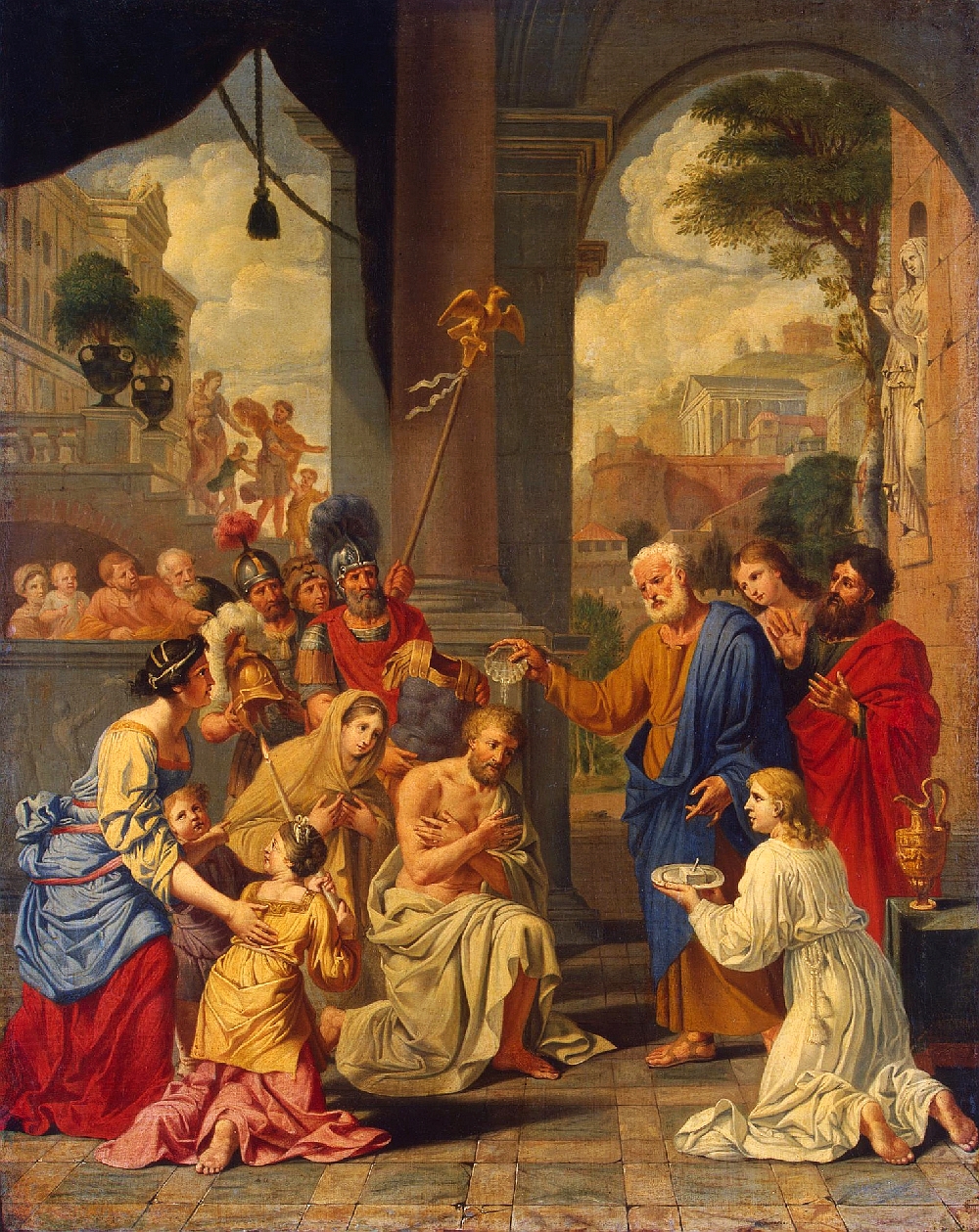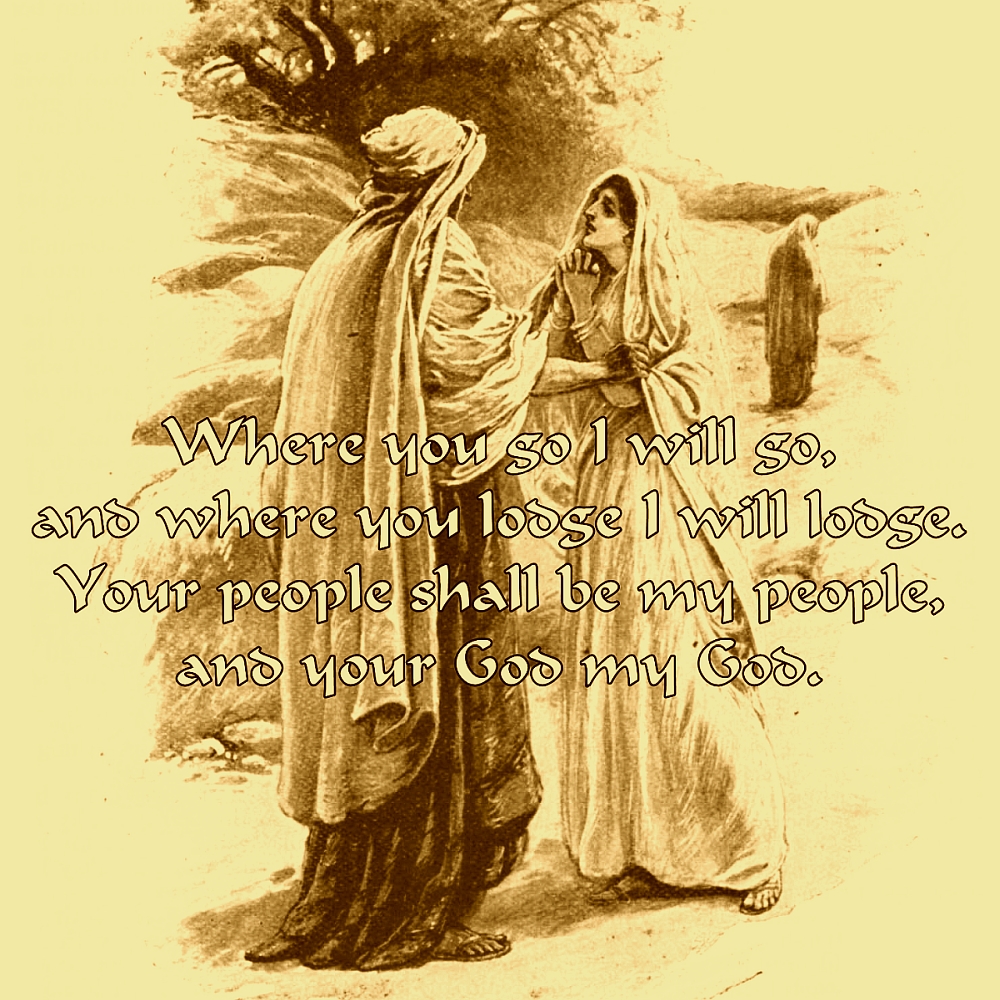Preached on Ruth 1:1-20
The Twenty-first Sunday after Pentecost — Proper 23C
9 October AD 2016
Title: Click to hear the MP3 of
Unbent, Unbroken, Unbounded Love.
 Summary:
Summary: Aliens. Strangers. Foreigners. Outcasts. In the minds of most Israelites, Moabites were all of these and more. Israel’s cousins were familial fallout, along with the Ammonites heirs of the incest of Lot and his daughters. Worse, instead of welcoming their kin home hundreds of years later, Moab hired Balaam to curse the God’s people as Israel journeyed to the Promised Land.
In response to their treachery, the Lord cursed Moab, pronouncing them unable to rejoin full worship fellowship with their family. Even if they married into Israel and lived in their midst, their men were barred from the tabernacle “even to the tenth generation. (
Deuteronomy 23:3; see also
vv. 4-8)”
Yet the Lord loved these outcasts and wanted them back as His own. And when an Israelite widow and her Moabite daughter-in-law found themselves impoverished and alone, He acted. Through the love shared by Ruth and Naomi — a love flowing from His own boundless mercy and grace — He received rejected Moab into His chosen people. Ruth of Moab found herself fully accepted into the clan of Ephrathah of the tribe of Judah.
More than merely showing that He cared even for oft-despised Gentiles, the Lord included Moab in the line of the coming Davidic kingship and thus into the earthly family of the coming Savior. An heir to Adam’s rebellion, Lot’s incest, Jacob’s deceit, David’s adultery and murder — Jesus was the righteous fruit who grew from a dead and decaying family tree. He not only claimed kinship with them but He also claimed their sins as His own and took them to the cross.
However, as the Lord said of His promised Son, “It is too light a thing that you should be my servant to raise up the tribes of Jacob and to bring back the preserved of Israel; I will make you as a light for the nations, that my salvation may reach to the end of the earth. (
Isaiah 49:6)” Therefore, Jesus claimed the sins of all people throughout all time — even yours and mine. We, the once-rejected, join all of the rescued, ransomed, redeemed, and restored people of God in rejoicing forevermore.
 Text:
Text: In the days when the judges ruled there was a famine in the land, and a man of Bethlehem in Judah went to sojourn in the country of Moab, he and his wife and his two sons. The name of the man was Elimelech and the name of his wife Naomi, and the names of his two sons were Mahlon and Chilion. They were Ephrathites from Bethlehem in Judah.
They went into the country of Moab and remained there. But Elimelech, the husband of Naomi, died, and she was left with her two sons. These took Moabite wives; the name of the one was Orpah and the name of the other Ruth. They lived there about ten years, and both Mahlon and Chilion died, so that the woman was left without her two sons and her husband.
Then she arose with her daughters-in-law to return from the country of Moab, for she had heard in the fields of Moab that the
Lord had visited his people and given them food. So she set out from the place where she was with her two daughters-in-law, and they went on the way to return to the land of Judah.
But Naomi said to her two daughters-in-law, “Go, return each of you to her mother's house. May the Lord deal kindly with you, as you have dealt with the dead and with me. The
Lord grant that you may find rest, each of you in the house of her husband!” Then she kissed them, and they lifted up their voices and wept.
And they said to her, “No, we will return with you to your people.”
But Naomi said, “Turn back, my daughters; why will you go with me? Have I yet sons in my womb that they may become your husbands? Turn back, my daughters; go your way, for I am too old to have a husband. If I should say I have hope, even if I should have a husband this night and should bear sons, would you therefore wait till they were grown? Would you therefore refrain from marrying? No, my daughters, for it is exceedingly bitter to me for your sake that the hand of the Lord has gone out against me.”
Then they lifted up their voices and wept again.
And Orpah kissed her mother-in-law, but Ruth clung to her. And she said, “See, your sister-in-law has gone back to her people and to her gods; return after your sister-in-law.”
But Ruth said, “Do not urge me to leave you or to return from following you. For where you go I will go, and where you lodge I will lodge. Your people shall be my people, and your God my God. Where you die I will die, and there will I be buried. May the
Lord do so to me and more also if anything but death parts me from you.” And when Naomi saw that she was determined to go with her, she said no more.
So the two of them went on until they came to Bethlehem. And when they came to Bethlehem, the whole town was stirred because of them. And the women said, “Is this Naomi?”
She said to them, “Do not call me Naomi; call me Mara, for the Almighty has dealt very bitterly with me.
Ruth 1:1-20
Scripture quoted from
The Holy Bible, English Standard Version®, © 2001 by Crossway Bibles, a publishing ministry of Good News Publishers. Used by permission. All rights reserved.
Audio: Click to hear the MP3 of
Unbent, Unbroken, Unbounded Love
NB: A few people have had problems trying to play the inline audio with Windows Media Player. If this occurs, you can either change to QuickTime or another default browser player, copy and paste the link directly into a selected player, or download it to your computer, where it seems to work regardless of which player. Several folks have suggested
VLC Player from VideoLAN.
Other Readings: Psalm 111;
2 Timothy 2:1-13;
Luke 17:11-19Labels: christ, christology, faith, family, gentiles, Gospel, incarnation, israelites, jesus, Law, lord, love, mercy, naomi, pentecost 21, proper 23, ruth, series c
 Summary: The Lord speaks of “foreigners who join themselves to God.” He promises those who love and serve Him full access to Him on His “holy mountain” in his “house of prayer for all peoples.”
Summary: The Lord speaks of “foreigners who join themselves to God.” He promises those who love and serve Him full access to Him on His “holy mountain” in his “house of prayer for all peoples.”





